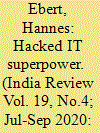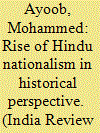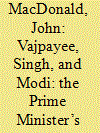| Srl | Item |
| 1 |
ID:
174826


|
|
|
|
|
| Summary/Abstract |
Why has India developed into one of the world’s top targets and sources of cyber attacks despite possessing a strategic edge in information and communications technology (ICT)? India has one of the most competitive ICT industries and workforces, largest global sourcing and fastest growing e-commerce markets, and second largest and fastest growing internet user base, and is a leader in using ICT to provide governance services, yet its economic and political information infrastructures have been disproportionality affected by cyber attacks. This article traces the evolution of cyber threats to India’s national security and identifies drivers of the national and international policies the Indian state has adopted to address these threats in the past two decades. It finds evidence for a growing gap between the ideation and implementation of cyber security legislation and policy, which is rooted in the political constraints inherent in India’s state capacity-building efforts, reluctance to engage in multistakeholder coordination, and struggles to yield gains from its hedging diplomacy in global cyber security negotiations. For the Security Studies scholarship on the sources of cyber insecurity, these findings highlight the need to further study the links between different types of cyber capacity, state structure and political systems as well as the specific conditions under which quickly digitizing democracies can effectively translate their ICT capacities and regulations into greater cyber resilience.
|
|
|
|
|
|
|
|
|
|
|
|
|
|
|
|
| 2 |
ID:
174827


|
|
|
|
|
| Summary/Abstract |
The article traces the rise of Hindu nationalism and its rise to power. It identifies three major variables responsible for Hindu nationalism’s rise and success. First, British historiography that made the Hindu-Muslim animosity the centerpiece for historical analysis in order to justify British rule coupled with a deliberate policy of divide and rule that widened the chasm between the two communities. Second, the writings of Savarkar and other ideologues such as Golwalkar that presented this dichotomy starkly and painted the Indian Muslim as the quintessential “other” thus arguing that Hindus alone were the real owners of the land and Muslims were interlopers. Third, and possibly the most important, the partition of the country in 1947 that hived away the Muslim majority areas from India thus rendering Indian Muslims demographically and politically marginal if not irrelevant in independent India thus paving the way for the eventual capture of power by Hindu nationalists.
|
|
|
|
|
|
|
|
|
|
|
|
|
|
|
|
| 3 |
ID:
174825


|
|
|
|
|
| Summary/Abstract |
This paper explores an under-researched area of India’s security relations with nations in West Asia. Counter Terrorism (CT) Cooperation between India and the Gulf nations has strengthened remarkably over the past five years after a prolonged period of limited cooperation on this critical issue. This paper explores why this has occurred. It argues that geopolitical factors associated with India’s rise, associated shifts in economic interests, and the changing security landscape in the Middle East and Afghanistan account for this new cooperation. It also discusses the impact of the Modi administration in altering the dynamics of India’s relationship with the two Gulf nations.
|
|
|
|
|
|
|
|
|
|
|
|
|
|
|
|
| 4 |
ID:
174824


|
|
|
|
|
| Summary/Abstract |
Indian Prime Ministers occupy the pinnacle of India’s government, national security hierarchy, and nuclear command and control infrastructure, which allows them to make decisions that transform Indian nuclear strategy. However, within India’s nuclear decision-making bureaucracy, other actors including India’s nuclear scientists and engineers, the military, and democratic processes can also adjust Indian nuclear strategy which creates rivalry. This article argues that the Indian Prime Minister’s position gives them the ability to influence and direct these various domestic political actors to make a nuclear strategy that suits the Prime Minister’s interests. But as bureaucratic actors actually translate the Prime Minister’s directions into policy, it results in influence often falling short of control in setting nuclear strategy. Applying a bureaucratic model to the making of nuclear strategy, the article’s findings suggest that Prime Ministers have purposefully guided and overseen India’s post-Pokhran-II nuclear strategy beyond a “minimal” credible deterrent outlined in its 1999 official nuclear doctrine.
|
|
|
|
|
|
|
|
|
|
|
|
|
|
|
|